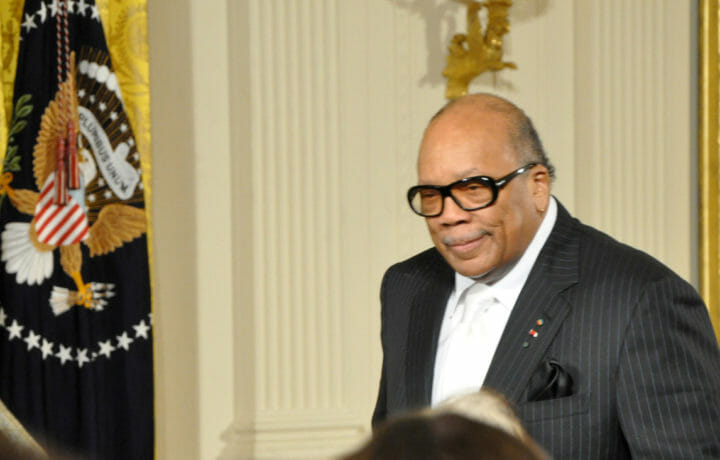The top selling musical album of all time (50 million units so far) sold more copies in just its first year than the second best-selling album (29 million) has done in 41 years. That did not happen by accident. Michael Jackson’s Thriller album was the second of his three most popular albums produced by the musical genius Quincy Jones.
Quincy Jones Leadership Lessons
We can learn from the lessons and life-turns that created a music man like Jones, who has been part of the music industry for 70 years and who has earned 28 Grammys during his lifetime…and he is not done.
1. Be empowered by your background.
Know where you come from so you know where you’re going. Quincy clearly remembers his struggles as a child and young man, and uses that to motivate him to move forward and to remind him to take a chance on those coming from similar places in life.
2. Be a mentor.
Jones grew up without any role model that looked like him. As he progressed in his musical career, he was careful to show people what it’s like to be dignified and proud of your skills and your life. The impact he made on younger musicians allowed him to stay in touch with the younger generations and help them. Being a mentor lets the future generations keep you relevant. To be a great mentor, you need to study your role models. Jones was wise throughout his career, and always took time to learn from the old guys around him. He chose curiosity over envy.
3. Capture the lightening safely.
Like most geniuses Quincy’s mind is always running. You need to develop a system to harness those thoughts and keep your brain from running you down physically. One tip he gives is to keep a pen and paper nearby you at all times because music is fleeting just like good ideas. Jones is a good example of the importance of having a trusted team around you to ensure you do not grind yourself down. He takes counsel from those he trusts, especially his family after Jones learned that the body has limits after a scary hospitalization.
4. Handle adversity wisely.
Jones grew up in a deadly time in America and in a tough neighborhood. He learned that you must know what you can control and what you cannot. Music was his path to freedom. He couldn’t control growing up without a mother, and certainly could not stop the racists who attacked him. One of his mentors Count Basie was like a father to him and gave him some powerful advice. “Learn how to handle valleys in life. The hills take care of themselves.” Jones chose to move to Paris to avoid the American bigotry that stopped him from arranging music for string musicians in the U.S. That allowed him to learn from a master who taught numerous world-renowned musicians. As Jones soon learned, travel gives you the opportunity to learn about and take part in local cultures and customs. It changes you and opens doors you never knew existed.
5. Don’t forget humility.
There is no doubt that by any measure Quincy Jones is a master of his craft. But he is quick to advise that you “be humble in your creativity…[because] ego is overdressed insecurity.” Jones was good, but that didn’t mean he could start at the top. In his early career, he decided he would write for anyone that would pay him. His humility and skill got him in the door with future Rock and Roll Hall of Fame inductee Dinah Washington from Alabama. Arranging music for the most popular black woman artist of the 1950s changed his life. The damn broke and he would end up working with top performers to include Frank Sinatra, Ella Fitzgerald, Peggy Lee, Lesley Gore (“It’s my party”), Chaka Khan, and James Ingram. He was influential in changing television and film with his productions and soundtracks, with works like The Fresh Prince of Bel-Air and The Color Purple.
Success Comes to Those Who Work for It
With all his success Quincy remembers to give back as well. His humanitarian efforts producing and conducting “We Are the World” was a historical global event that was focused on raising funds for victims of famine in Ethiopia. Jones rose to the top of his field and broke barriers along the way. By 1961, Jones became the vice-president of Mercury Records. He was the first African American to earn that role. Jones credits his father for an ideal that he uses so well, “Do it well or not at all,” was a phrase he heard every day from his dad.




